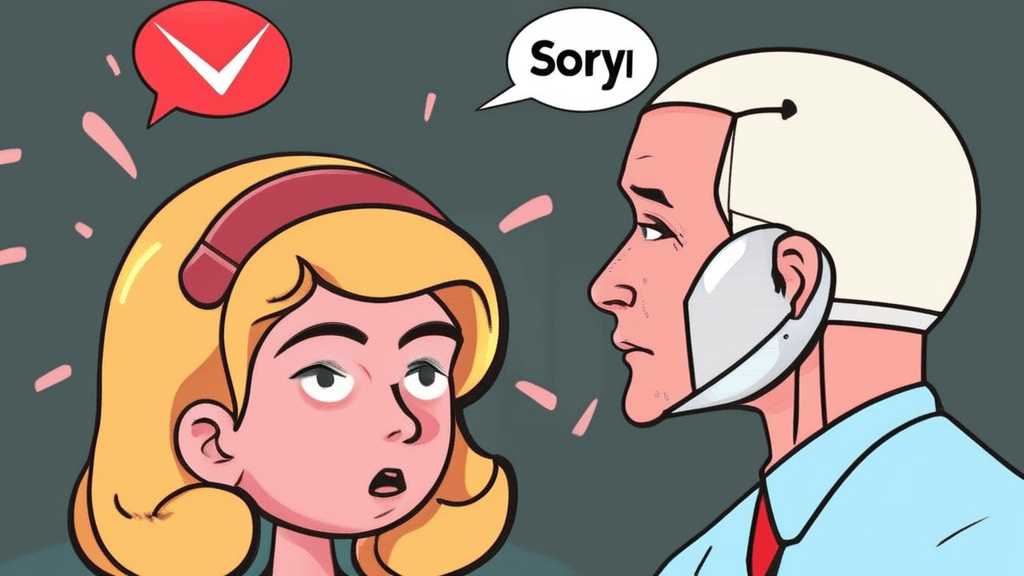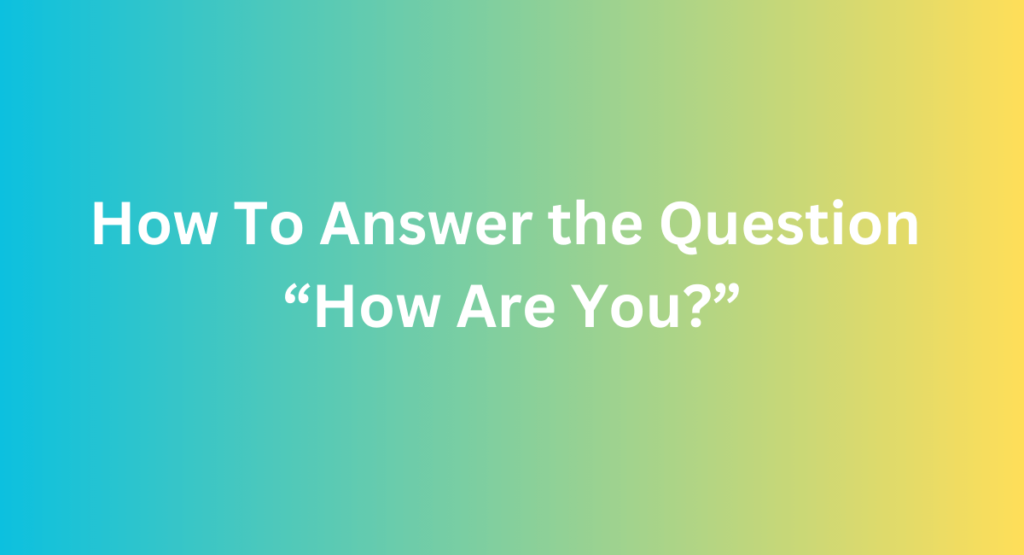When someone says sorry, you can reply by saying “I appreciate your apology” or “Thanks for saying that.” It’s important to recognize their effort and show your appreciation, even if you’re still upset.
When someone apologizes, it can sometimes be difficult to know how to respond. In these situations, it’s important to handle the interaction with grace and understanding. By carefully choosing your words, you can acknowledge the apology without dismissing your own feelings or minimizing the impact of what happened.
This article will explore some effective ways to reply when someone says sorry, providing you with different phrases and approaches to consider. By utilizing these responses, you can navigate apologies in a respectful and meaningful way.
Understanding Different Responses
When someone apologizes to you, it’s important to respond in a way that acknowledges their apology and fosters understanding and resolution. Understanding different responses can help navigate these situations with grace and kindness. In this section, we will explore various ways to respond when someone says sorry.
Accepting The Apology
When accepting an apology, it’s essential to show gratitude and appreciation for the person’s effort in apologizing. This response can help to mend the relationship and move forward. Here are some examples of how to accept an apology:
- Say something like, “I appreciate your apology. It takes courage to admit mistakes.”
- Express gratitude by saying, “Thanks for saying sorry. It means a lot to me.”
- Respond with understanding, “I understand and accept your apology. Let’s put this behind us.”
Expressing Forgiveness
Forgiveness is a powerful response that can promote healing and growth. When someone apologizes, expressing forgiveness can help both parties move past the issue. Here are some ways to express forgiveness:
- Say, “I forgive you. Let’s move on from this.”
- Respond with empathy, “I understand that everyone makes mistakes. I forgive you.”
- Express willingness to let go of resentment by saying, “I appreciate your apology. I forgive you, and I hope we can rebuild our trust.”
Explaining The Impact
There are times when it’s important to explain how someone’s actions have affected you, even after they apologize. This response can help them understand the consequences of their behavior. Here are some examples of explaining the impact:
- Say, “Your actions deeply hurt me, and while I appreciate your apology, it will take time for me to heal.”
- Express the importance of boundaries, “I want you to know that what you did crossed a line. I hope we can rebuild our relationship, but it will require trust-building.”
- Communicate the need for change, “Your actions have had a significant impact on me. I hope your apology is sincere, and you take steps to ensure it doesn’t happen again.”
Offering Reassurance
In some cases, the person apologizing may seek reassurance that everything is okay between you. Offering reassurance can help alleviate their guilt and promote a sense of closure. Here are some ways to offer reassurance:
- Say, “Thank you for apologizing. I understand that people make mistakes, and I believe in forgiveness.”
- Express the desire to move forward, “Let’s put this behind us and focus on building a better future together.”
- Assure them of your willingness to work through the issue, “I appreciate your apology, and I’m committed to finding a resolution that works for both of us.”
Remember, understanding different responses when someone says sorry allows for effective communication and reconciliation. Choose a response that aligns with the situation and your feelings, enabling both parties to move forward positively.
Polite Responses
When someone says sorry, it’s important to respond politely. You could say, “I appreciate your apology,” or “Thank you for saying that. ” Acknowledging their effort can help maintain a positive relationship.
Thank You
When someone apologizes, it’s important to acknowledge their gesture and show appreciation for their apology. One polite response you can use is to say, “Thank you.” This simple phrase conveys gratitude and lets the person know that you recognize their effort in apologizing.
By saying “Thank you,” you not only show that you value their apology, but you also create a positive atmosphere for further communication. It’s a polite way to accept their apology and move towards resolving any issues that may have arisen.
No Problem
Another polite response when someone says sorry is to use the phrase “No problem.” This response conveys that you understand their apology and that you do not hold any grudges or ill feelings toward them.
Saying “No problem” not only reassures the person that their apology is accepted, but it also helps to alleviate any guilt or discomfort they may be feeling. It’s a polite way to let them know that you are okay with what happened and that you are willing to move forward.
It’s Okay
If someone apologizes to you, you can respond by saying “It’s okay.” This response acknowledges their apology and assures them that you are not upset or holding any negative emotions towards them.
By saying “It’s okay,” you provide reassurance and understanding, which can help ease any tension or awkwardness that may be present. It’s a polite way to accept their apology and let them know that you are willing to let go of any offense or hurt that may have been caused.
I Appreciate It
Expressing appreciation when someone apologizes is another polite response you can use. Saying “I appreciate it” shows that you value their apology and the effort they put into recognizing and making amends for any wrongdoing.
By expressing appreciation, you validate their apology and let them know that their gesture means a lot to you. It’s a polite way to accept their apology and show that you are open to resolving any issues or conflicts that may have arisen.
Expressing Understanding
When someone apologizes to you, it’s important to respond in a way that expresses understanding and acknowledges their effort. By doing so, you can maintain a positive and respectful conversation. Here are a few ways you can convey that understanding:
I Understand
If you truly understand the situation and empathize with the person who apologized, let them know with a simple “I understand.” This short but powerful response shows that you are aware of their intention and recognize their sincerity.
I Get It
Another way to convey your understanding is by saying “I get it.” This phrase conveys that you have comprehended their apology and the situation at hand. It reassures the other person that you are open to moving forward.
That’s Alright
When someone apologizes, you might want to assure them that everything is alright. By responding with “That’s alright,” you let them know that you accept their apology and are ready to put the past behind.
I Know How You Feel
In some cases, you may have experienced a similar situation. Sharing your understanding by saying “I know how you feel” can create a connection and make the other person feel heard.
Remember, the key is to respond in a way that acknowledges their apology, fosters understanding, and allows both parties to move forward. Choose a response that feels genuine to you and the situation at hand.
Acknowledging The Apology
When someone says sorry, it’s important to acknowledge their apology. You can respond with phrases like “I appreciate your apology” or “Thanks for saying that. “
Apology Accepted
When someone apologizes to you, it’s important to acknowledge their effort and show them that you appreciate their apology. By accepting their apology, you can pave the way for forgiveness and move forward in the relationship.
If you genuinely feel ready to accept the apology, you can respond by saying, “I appreciate your apology, and I accept it. Let’s put this behind us and move on.” This response not only acknowledges the apology but also conveys your willingness to move forward and let go of any resentment.
Apology Noted
Sometimes, accepting the apology might not be the right course of action. Perhaps the apology was not sincere or you need more time to process your emotions. In such cases, it’s important to let the person know that you have noted their apology, but you’re not ready to completely forgive and forget just yet.
You can respond by saying, “I understand that you apologized, and I appreciate the gesture. However, I need some time to process my feelings about what happened. Let’s revisit this conversation when I’m ready.” This response shows that you acknowledge their apology but emphasizes the need for personal reflection and time before moving forward.
I Hear You
In some situations, the apology may not change the outcome or the impact it had on you. While you may not be able to fully accept the apology, it’s essential to let the person know that you have heard their words and acknowledge their attempt to make amends.
A suitable response in this scenario could be, “I hear what you’re saying, and I appreciate you apologizing. While I can’t say that everything is okay, I acknowledge your effort in trying to make things right.” This response communicates that you understand their apology and appreciate their intention to address the situation, even if it doesn’t change the outcome.
Not A Problem
There are instances where the apology relates to a minor issue that didn’t have a significant impact on you. In such cases, you may choose to reply with a simple reassurance that the apology is not a problem and that you’re ready to move on.
A suitable response could be, “It’s not a problem at all. Thank you for apologizing, and I appreciate your concern. Let’s put this behind us and continue our interaction.” This response conveys that you don’t hold any grudges and are willing to move forward without any lingering negativity.
Making Amends
When someone says sorry, it’s important to acknowledge their effort and express gratitude. You can respond by saying, “I appreciate your apology” or “Thanks for saying that. ” Remember to respond genuinely, even if you’re still feeling upset.
Let’s Move On
If someone apologizes sincerely, it’s important to acknowledge their effort and express your willingness to move forward. By saying “Thanks, I forgive you” or “We’re good,” you communicate your readiness to let go of any lingering negative emotions, paving the way for a fresh start.
It’s Water Under The Bridge
When responding to a heartfelt apology, remember that dwelling on past mistakes only hinders progress. Uttering the words “It’s water under the bridge” signifies that you are willing to put the incident behind you and focus on the present and future instead.
No Need To Worry
Assure the individual who has apologized that there is no need for further concern by saying, “Thank you for your apology; it’s all good now.” This simple statement lets them know that you’ve accepted their apology and that they don’t need to keep worrying about it.
Frequently Asked Questions On How To Reply When Someone Says Sorry
How Do You Respond When Someone Apologizes?
When someone apologizes, you can respond by saying, “I appreciate your apology” or “Thank you for saying that. “
How Do You Respond To An Apology Without Saying It’s Ok?
You can respond by saying, “I appreciate your apology, but I still feel upset about what happened. I need some time to process it. “
How Do You Respond Instead Of I’m Sorry?
You can respond with phrases like “I understand” or “Thank you for your apology. ” This acknowledges their effort while expressing your feelings.
How Do You Respond To I’m Sorry When It’s Not Ok?
When someone apologizes and it’s not ok, acknowledge their effort and express your feelings. Say, “I appreciate your apology. ” Or “Thank you for saying that. “
Conclusion
Apologies are not always easy to respond to, but it’s important to acknowledge the effort behind them. Instead of dismissing the apology, express your appreciation for their sincerity. A simple “I appreciate your apology” or “Thanks for saying that” can go a long way in showing that you recognize their intent.
Remember, the goal is to maintain a respectful and understanding conversation, even if you’re still processing your emotions. Take your time to respond authentically and move forward on your own terms.



